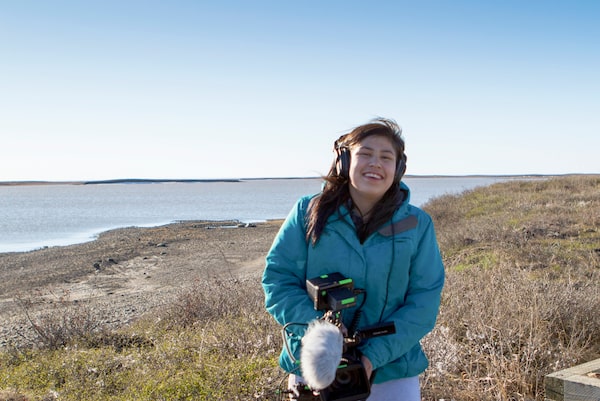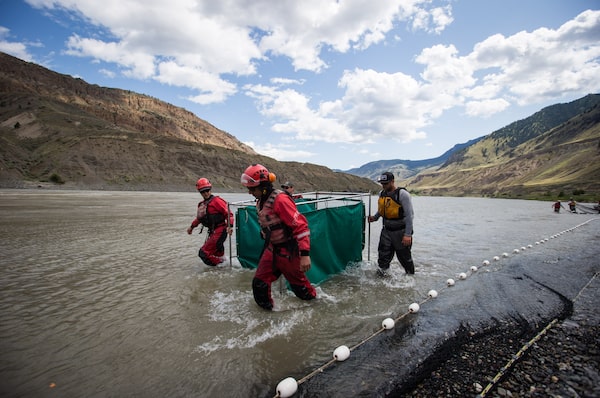
The young people who spoke with The Globe and Mail, from left: Rowan McKenzie and Carmen Kuptana, Sophie Mathur and Reanne George, Lilah Williamson, Eriel Lugt and Kaitlyn Lulua.DARRYL DYCK AND GINO DONATO/THE GLOBE AND MAIL; HANDOUT PHOTOS
At the World Economic Forum in Switzerland in January, the 17-year-old Swedish environmentalist Greta Thunberg urged global leaders to cut down on carbon emissions immediately. “Your inaction is fuelling the flames by the hour,” she said. “And we are telling you to act as if you loved your children above all else.”
She was reminding politicians that climate change is already a reality for youth today. This is especially true for young Canadians who are growing up in a country that has already overall warmed by nearly 2 degrees Celsius since the 1940s, and is heating up even more quickly in the Far North. “Both past and future warming in Canada is, on average, about double the magnitude of global warming,” the federal government said in a landmark report released last year.
In recent months, The Globe spoke to a cross-section of concerned young Canadians. Some considered themselves activists; others did not. But what unites them is shared sense of alarm about pollution, shifting ecosystems, ominous weather events – and, most of all, the dread of growing up in a warming world.
(All interviews below have been condensed and edited for brevity.)
On the farm
Today’s young farmers will navigate more droughts and floods tomorrow, as climate change forces questions about which crops to grow.
ROWAN MCKENZIE, 10, BALDERSON, ONT.
Handout
“We have about 93 acres and the main business is grass-fed beef.
I have a little garden that I sell at the market in Ottawa. What I grew that actually sold was beets, carrots, Swiss chard, kale, tomatoes.
The weather matters quite a bit to our business and to our lives. If the weather changes and things can't grow, then we know. The grass has to grow, the veggies have to grow, the cows have to live.
It is starting to get harder to predict what is going on, the weather and how the climate is going to be like. In the spring this year, it was very wet for us. I had quite a bit of trouble planting. And now the grass isn’t growing for the cows. We usually feed the cows hay throughout the winter, but we’re having to feed them hay quite a bit earlier than we usually have to. I think it’s because the rain wasn’t steady. It was too wet and then too dry this year.
I’ve had a few people who don’t believe in climate change. And I just say that there’s definitely evidence it’s not a joke, it’s actually happening. The world is getting warmer and the Arctics are melting.”
In Tuktoyaktuk, a village in the Northwest Territories, rising sea levels and melting permafrost have heightened the risk of erosion dragging the community into the Beaufort Sea.Patrick Dell/The Globe and Mail/The Globe and Mail
In the Arctic
Few parts of the world are warming faster than Canada’s Far North. Coastal communities like Tuktoyaktuk are moving inland, as rapidly rising seas entice unfamiliar fish.
ERIEL LUGT, 17, TUKTOYAKTUK, NWT

Courtesy of Maeva Gauthier
“Underneath my house there’s a big gap because we’re above the beach. Water is rising. We’re supposed to be getting rip-rap [concrete slabs] put out below our house.
On the water side, the balcony is ready to cave in. When I go out on my balcony, I see the whole town and the harbour. And then it overlooks the ocean.
A scientist came up here with his crew this summer, and he was basically doing samples all over: Like ‘Where is a good, solid place for Tuktoyaktuk to be relocated?'
They still have a good maybe 50 years until the old Tuktoyaktuk is eroded and until the new Tuktoyaktuk that they’re planning on building starts to get affected.
It’s happening to us now. It’s affecting our culture now. When our communities are gone, then where will the erosion and the climate change happen next?”
CARMEN KUPTANA, 17, TUKTOYAKTUK, NWT

Courtesy of Maeva Gauthier
“Every year its getting warmer and warmer. We are starting to get salmon up here and you never used to get salmon.
People think it is pretty good because when they catch the salmon you don’t have to buy it from a store any more. But then, other people think, ‘Oh a new species is coming in and it could decline the numbers of whitefish.’
So there’s pros and cons.
I like whitefish better because it just has a better taste to me. If this keeps on happening, other species will be run out of natural habitats. Maybe it could be like the salmon overpopulating and getting rid of our whitefish.
It wasn’t a one-off; it wasn’t like somebody caught a salmon. It’s like it’s been turning up and turning up a lot.
It’s just sad to know that our world is getting erased away three times faster than anyone else. And it’s not even our fault for doing it.”
In Northern Ontario
In 2019, the Northern Ontario community of Sudbury was walloped by record snowfalls and rapid thawing and freezing cycles. City officials ordered the Mathur family to evacuate their home and rebuild their roof after it buckled under a metre of ice.
SOPHIA MATHUR, SUDBURY, ONT.
Gino Donato/Gino Donato/The Globe and Mail
“I got home, I think it was from dance. And then I went up to my room and got dressed. And then I just plopped down on my bed and I looked up on the ceiling and there is a big, humongous crack – that was scary.
You have to live in a hotel and people are telling you that it's not that bad. Then you see on the news that multiple people are suffering from hurricanes, droughts, floods, it makes you so mad.
I don’t understand why people could just not care until it actually happens to them.
I think most people like to think of climate change as global warming. So it's hard for them to think that snow is a part of climate change.
The experts are saying that it is an emergency. I mean this is because of us and that we’re doing this to ourselves.
And not just ourselves. We’re doing this to animals, we’re doing this to the entire Earth. And it just makes no sense when you’re a child.”

Fisheries officials and B.C. Wildfire Service staff move salmon in a temporary holding pen on the Fraser River near Big Bar, west of Clinton, B.C., this past July. The fish are being transported with a helicopter past a massive rockslide that prevented salmon from reaching their spawning grounds.Darryl Dyck/The Canadian Press/The Canadian Press
On the Fraser River
A landslide in a remote B.C. canyon blocked parts of the Fraser River last summer, obstructing a salmon run several First Nations communities depend upon.
KAITLYN LULUA, 12, XENI GWET’IN FIRST NATION, B.C.

Supplied
“I like eating [salmon] when it’s smoked or how my mom makes it, with mustard and all the other ingredients, cooked on the stove.
We usually do fishing every year. They put their net in the water, and I see them pushing the net down the river, because sockeye salmon go up. I haven’t done dip net [fishing] yet – I kind of want to, but there was a rock slide that blocked the river for the fish coming up.
I’ve been told that the fish [we bought] were expensive, from off the coast of Vancouver. This year when we tried to dry the fish, it was a lot softer. We had to hang it a different way, so it didn’t drop.
I’m working on a poster about climate change right now. There were lots of floods this year; the glaciers are melting too fast. That makes the hay grow not that well and so the horses and the cows can't get to their natural feeding ground. We have seven horses. We mainly use the horses for riding or helping to take a deer out, and to go in rodeos. I’ve been riding since I was five.”

A wildfire burns on a logging road southwest of Fort St. James, B.C., on Aug. 15, 2018.Darryl Dyck/The Canadian Press/The Canadian Press
On the West Coast
In the summer of 2018, Vancouver’s sun appeared otherworldly as faraway forest fires raged in the province, causing smog alerts.
LILAH WILLIAMSON, 15, BURNABY, B.C.
DARRYL DYCK/Darryl Dyck/The Globe and Mail
“There were fires basically all across B.C. Not in the Vancouver, Lower Mainland area, but definitely from Northern B.C. All the smoke would get blown down over Vancouver and Burnaby where I live. The air quality was really terrible and super-smoky.
Burnaby is nowhere near the front lines of the climate crisis. So that was crazy that we were seeing that big of an impact.
I remember the sun was red. Like it totally turned like this blood-colour, which is really weird. And the moon as well. I remember there was one Sunday and I was sitting in my living room and it smelled like there was a barbecue going on, like right outside – like the world’s biggest barbecue. But it was the forest fire smoke.
We’re already seeing the impact even in Burnaby, in Vancouver.
It’s not this far-away future fantasy-like nightmare that is maybe never going to happen. It’s happening right now."
Soldiers from the 4th Artillery Regiment clear snow at a residence in St. John’s on Jan. 20. The province issued a state of emergency for the record snowfall.Andrew Vaughan/The Canadian Press/The Canadian Press
On the East Coast
Atlantic Canada is grappling with polluted waterways, rising seas and record hurricanes and snowfall.
REANNE GEORGE, 17, MILLTOWN, N.L.

Handout
“I’ve been working with the Conservation Corps of Newfoundland and Labrador this summer. I got to see a lot and learn a lot about how we have such a large impact on our oceans.
It’s crazy. I didn’t realize that it was so significant till the summer. My role was to organize and facilitate shoreline cleanups and collect data about marine debris.
We found a lot of plastic. We were expecting to find a lot of plastic straws. But we found mainly plastic film.
We have really low and high tides. And we have a lot of extreme weather patterns.
We had a flood just two or three years ago that washed out a lot of our roads. When we have rain, it’s a lot of rain. I look out my window and I see the bay. So water levels rising means that a lot of people are going to lose their homes around here.”
Our Morning Update and Evening Update newsletters are written by Globe editors, giving you a concise summary of the day’s most important headlines. Sign up today.